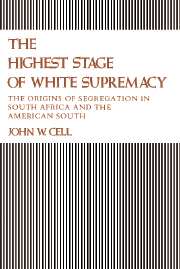Book contents
- Front Matter
- Contents
- Preface
- 1 The Problem of Segregation
- 2 Contemporary Perspectives
- 3 Recent Interpretations of the Origins of Segregation in South Africa
- 4 The Origins of Segregation in the American South: The Woodward Thesis and Its Critics
- 5 The South Makes Segregation: The Economic Interpretation
- 6 The South Makes Segregation: The Social Interpretation
- 7 A Note on Southern Moderates and Segregation
- 8 South Africa Makes Segregation
- 9 Conclusion: Reactions to Segregation
- Notes
- Index
5 - The South Makes Segregation: The Economic Interpretation
Published online by Cambridge University Press: 22 September 2009
- Front Matter
- Contents
- Preface
- 1 The Problem of Segregation
- 2 Contemporary Perspectives
- 3 Recent Interpretations of the Origins of Segregation in South Africa
- 4 The Origins of Segregation in the American South: The Woodward Thesis and Its Critics
- 5 The South Makes Segregation: The Economic Interpretation
- 6 The South Makes Segregation: The Social Interpretation
- 7 A Note on Southern Moderates and Segregation
- 8 South Africa Makes Segregation
- 9 Conclusion: Reactions to Segregation
- Notes
- Index
Summary
The previous chapter analyzed the long and still apparently unfinished debate between C. Vann Woodward and his critics concerning the origins of segregation in the American South. There I made two important points. First, the two sides seem to be discussing essentially different problems. Woodward argues that the pace of segregationist rhetoric and legislation accelerated only after 1890. The revisionists contend that in practice the races had drifted and had been pushed violently apart long before that. These interpretations, however, are not necessarily incompatible. This may be one of those relatively few cases when both sides are right. Indeed, if de facto segregation had already thoroughly pervaded the life of the region, then Woodward's thesis centering on the chronology of Jim Crow and black disfranchisement seems all the more significant. What, after all, was all the fuss about? If the South already had segregation in practice, why did it have to create segregation as a system and an ideology? Apparently some new set of circumstances, some hitherto unacknowledged challenges, must have come into existence.
Second, whereas in Origins of the New South Woodward had argued persuasively in favor of the unity of economic and political power, in his later The Strange Career of Jim Crow those two factors drifted mysteriously apart. Politicians and businessmen, as well as their needs, became more or less separate and distinct. In Woodward's view the origins of segregation were overwhelmingly political. Indeed, he argued forcefully in favor of a politicians' conspiracy.
- Type
- Chapter
- Information
- The Highest Stage of White Supremacy , pp. 103 - 130Publisher: Cambridge University PressPrint publication year: 1982



